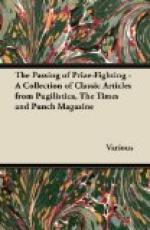“You take my tip, Sir,” he said, “and buy Wild Oats. If you’ll excuse the word—” (Nibletts is always apologising for some term he is about to use, which promises to be inexpressibly shocking to polite ears, and never is)—“they’re clinkers.”
We ordered a round dozen. We also bought a hen-house fitted with all modern conveniences. The total outlay represented a prince’s ransom; but, as I pointed out to my aunt, we had a run for our money.
The hens, when they arrived, were not strictly “as per” advertisement. We bought them as laying pullets, and they didn’t lay for quite a time—so far as we knew. Nibletts, however, declared that they were “what you might call in the pink,” and surmised that the train journey had “put ’em off the lay, as you might say.” If eating and fighting were evidences of their being “in the pink,” those birds must have enjoyed exceptional health. They also slept well, I believe.
After about a month one enormous egg arrived—an egg that would not have disgraced a young ostrich. Its huge dimensions worried my aunt. She wondered if they were a symptom, and consulted Nibletts.
He put it down to the food. He said that kitchen scraps were “no good for laying pullets.” “That egg, lady,” he said, “is what us fanciers call—excuse me—” (I saw my aunt shudder in anticipation)—“a bloomer. You must give ’em a lot more meal.”
We bought a big sack of meal—through the medium of Nibletts. If I remember rightly it cost rather more than the pullets.
Still no eggs. Then some of the hens went out of “the pink.” For instance, one developed a chronic habit of running centripetally round a constantly diminishing circle, fainting on arriving at the geometrical centre. My distressed aunt called in Nibletts to prescribe. There was only one word for it—that awful word “staggers.” There was only one cure for it—death. Should he wring its neck?
We feelingly withdrew, and he did it. He took the corpse away with him, so that he presumably had a use for it.
Soon a second pullet went down with a considerably swollen face. My aunt bathed it twice a day in a hot anti-septic, but to no purpose, except that the poor thing seemed much comforted by the fomentation. That hen was, Nibletts whispered to me, for fear my aunt should overhear, “a waster.” The only thing to do was to coop it up from the rest, or they’d all go down with it—whatever it was.
We cooped it up till it died. Nibletts certified the cause of death as that unmentionable complaint, the pip.
Still no eggs, notwithstanding repeated appeals in the sacred name of Macduff. We did, however, find out what the trouble was.
The hens were eating the eggs!
Nibletts said—under his breath—that they were what was known as “blighters.” He recommended (deprecating the term) a “stodger.” A “stodger” proved to be an egg-shell stuffed with bread-crumbs, mustard and the strongest photographic ammonia.




